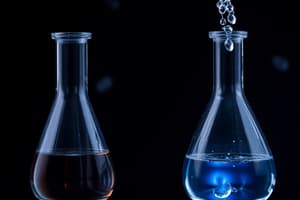Podcast
Questions and Answers
What type of electrons usually do not participate in chemical reactions?
What type of electrons usually do not participate in chemical reactions?
- Core electrons (correct)
- Orbital electrons
- Valence electrons
- Atomic electrons
According to Kekulé and Couper, how many bonds does carbon typically form in stable compounds?
According to Kekulé and Couper, how many bonds does carbon typically form in stable compounds?
- Two bonds
- Three bonds
- Four bonds (correct)
- Five bonds
Which scientist proposed the concept of a carbon-carbon triple bond?
Which scientist proposed the concept of a carbon-carbon triple bond?
- Emil Erlenmeyer (correct)
- Archibald Couper
- Jacobus van’t Hoff
- Alexander Crum Brown
In what year did Kekulé propose that carbon chains can form rings of atoms?
In what year did Kekulé propose that carbon chains can form rings of atoms?
According to van’t Hoff, how are the four atoms to which carbon is bonded oriented?
According to van’t Hoff, how are the four atoms to which carbon is bonded oriented?
What denotes stability in a stable atomic arrangement?
What denotes stability in a stable atomic arrangement?
According to Dalton's atomic theory, elements are composed of:
According to Dalton's atomic theory, elements are composed of:
Which of the following statements is consistent with Dalton's atomic theory?
Which of the following statements is consistent with Dalton's atomic theory?
What does Dalton's atomic theory imply about the number of atoms during a chemical reaction?
What does Dalton's atomic theory imply about the number of atoms during a chemical reaction?
Which concept is NOT derived from Dalton's atomic theory?
Which concept is NOT derived from Dalton's atomic theory?
What principle related to chemical reactions is consistent with Dalton's atomic theory?
What principle related to chemical reactions is consistent with Dalton's atomic theory?
In Dalton's atomic theory, what is the significance of atoms being indivisible?
In Dalton's atomic theory, what is the significance of atoms being indivisible?
According to Dalton's atomic theory, which statement is true about atoms of the same element?
According to Dalton's atomic theory, which statement is true about atoms of the same element?
In a compound, what is the ratio of the numbers of atoms of any two different elements present?
In a compound, what is the ratio of the numbers of atoms of any two different elements present?
Which law states that different samples of the same compound always contain its constituent elements in the same proportion by mass?
Which law states that different samples of the same compound always contain its constituent elements in the same proportion by mass?
What is the composition of an atom according to the experiments conducted by scientists?
What is the composition of an atom according to the experiments conducted by scientists?
The Law of conservation of mass states that:
The Law of conservation of mass states that:
What is the charge on neutrons, protons, and electrons respectively?
What is the charge on neutrons, protons, and electrons respectively?
Flashcards are hidden until you start studying





